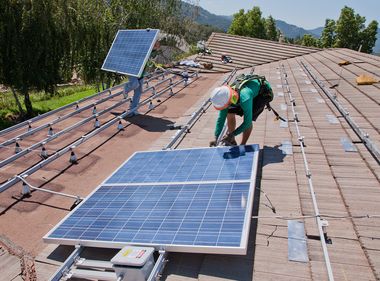Celebrating 50 Years of Love for Mother Earth
Celebrating 50 Years of Love for Mother Earth
In 1972, biology teachers at Newport Harbor High School and local volunteer groups created a living nature laboratory out of soil dumped during the construction of the school’s Olympic-sized swimming pool. Fifty years later, the Environmental Nature Center has blossomed into a model of environmental education and energy efficiency.
When the Environmental Nature Center built a new learning center in 2008, it made sure the building was certified LEED Platinum, the highest rating for building energy efficiency. Solar panels provide all the electric power the center needs. In fact, it was among the first buildings in Southern California Edison’s service area to become a net energy producer.
“We made a conscientious effort to build our building as sustainable as possible. We wanted to be an example for the community and for local businesses of how to build things better, how to have less impact on our natural resources,” said Bo Glover, executive director of the Environmental Nature Center, which received a $10,000 Edison International grant this year. “Several of our programs talk about energy use and conservation of our energy resources. Edison’s support has served us so well for a decade.”

The center recently went through a mission change, going beyond its original mission of teaching students through hands-on experiences with nature, to now helping connect the entire community to the natural world.
“We are now providing transformative experiences through a connection with nature. That is what guides us,” said Glover, who laments the disconnect from nature many people experience by spending extensive time in front of one type of electronic screen or another.
The Environmental Nature Center provides a sensory extravaganza, walking visitors through a combination of 15 California native plant communities ranging from a desert to a redwood forest.
“We’re proud to support the ENC in its environmental leadership for the health of plant life, wildlife and future generations alike,” said Armando de la Libertad, Southern California Edison Government Relations manager. “From the recycled denim building insulation to the caretaking of pollinators, clean energy demonstration projects, and educational summer camps on bugs, science and plants, the ENC serves as a model for effective community education and habitat and species protection.”

The center’s main clientele is students. Glover says every school district in Orange County participates in a wide range of programs tailored specifically to all grade levels. The center also has a nature-based preschool, where children learn by touching streams, plants and animals rather than just reading about them. The Environmental Nature Center is also increasing its outreach to schools in communities of color while providing reduced fees for schools with many low-income students.
“We have found that our job is connecting these kids to the natural world. A lot of the kids that come here have not been to a natural area before,” Glover said. “The only trees they’ve seen are the palm trees in their courtyard. They are spending on average 7½ hours a day on some sort of screen. Now, I’m not saying screens aren’t important, but there needs to be a better balance.”




